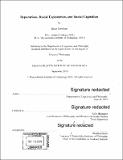| dc.contributor.advisor | Sally Haslanger. | en_US |
| dc.contributor.author | Lenehan, Rose(Rose Elizabeth) | en_US |
| dc.contributor.other | Massachusetts Institute of Technology. Department of Linguistics and Philosophy. | en_US |
| dc.date.accessioned | 2020-03-09T18:53:27Z | |
| dc.date.available | 2020-03-09T18:53:27Z | |
| dc.date.copyright | 2019 | en_US |
| dc.date.issued | 2019 | en_US |
| dc.identifier.uri | https://hdl.handle.net/1721.1/124099 | |
| dc.description | Thesis: Ph. D. in Linguistics, Massachusetts Institute of Technology, Department of Linguistics and Philosophy, 2019 | en_US |
| dc.description | Cataloged from PDF version of thesis. | en_US |
| dc.description | Includes bibliographical references (pages 67-72). | en_US |
| dc.description.abstract | We live in a starkly racialized economy: an economy whose history includes the Atlantic slave trade, enslaved plantation labor, and Jim Crow. The economic relations and social practices that have emerged from that history constitute, as Charles Mills puts it, "a system that is run by whites for white benefit." The question guiding this set of papers is how to pursue a racially just economy in light of this history. In the first paper, "Reparations and the Racial Wealth Gap," I evaluate the argument that the closure of the racial wealth gap is owed as reparations for the injustices that created it. I argue that there are a number of problems with the argument; most importantly, it treats racial populations as separate corporate bodies, and in doing so obscures class differences within them. In the second paper, "Racial Exploitation and the Race-Class Nexus," I argue against Charles Mills's theory of racial exploitation. | en_US |
| dc.description.abstract | Mills argues that racial justice requires redistributing the proceeds from past racial exploitation and that racial exploitation can be distinguished from 'standard capitalist' exploitation. I argue that Mills's characterization of racial exploitation does not fit the most important historical cases, in part because Mills ignores processes of racial formation. So the concept of racial exploitation cannot provide the grounds for redistribution that Mills intends it to. Mills frames his project as a demand for a non-racial capitalism. In the third paper, "On the Idea of a Non-Racial Capitalism," I assess this broader goal. Many radical theorists and activists have argued that race and racism play critical roles in reproducing capitalist social relations and thus would argue that a non-racial capitalism is impossible. | en_US |
| dc.description.abstract | I argue that we do not need to make any general claims about capitalism and racism to see why this goal is confused; instead, we need to recognize how distant a non-racial capitalism is from our own. Getting to something that could be called a non-racial capitalism would require not merely a redistribution of wealth but a reconfiguration of global relations of production. | en_US |
| dc.description.statementofresponsibility | by Rose Lenehan, | en_US |
| dc.format.extent | 72 pages ; | en_US |
| dc.language.iso | eng | en_US |
| dc.publisher | Massachusetts Institute of Technology | en_US |
| dc.rights | MIT theses are protected by copyright. They may be viewed, downloaded, or printed from this source but further reproduction or distribution in any format is prohibited without written permission. | en_US |
| dc.rights.uri | http://dspace.mit.edu/handle/1721.1/7582 | en_US |
| dc.subject | Linguistics and Philosophy. | en_US |
| dc.title | Reparations, racial exploitation, and racial capitalism | en_US |
| dc.type | Thesis | en_US |
| dc.description.degree | Ph. D. in Linguistics | en_US |
| dc.contributor.department | Massachusetts Institute of Technology. Department of Linguistics and Philosophy | en_US |
| dc.identifier.oclc | 1142634549 | en_US |
| dc.description.collection | Ph.D.inLinguistics Massachusetts Institute of Technology, Department of Linguistics and Philosophy | en_US |
| dspace.imported | 2020-03-09T18:53:27Z | en_US |
| mit.thesis.degree | Doctoral | en_US |
| mit.thesis.department | Ling | en_US |
